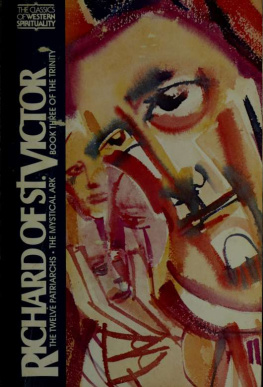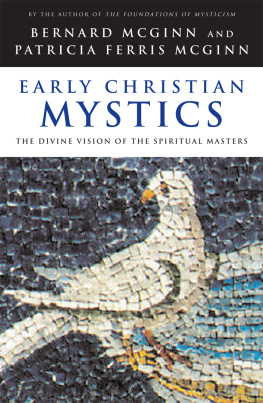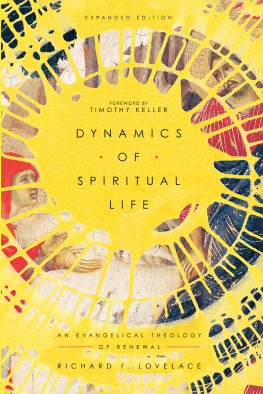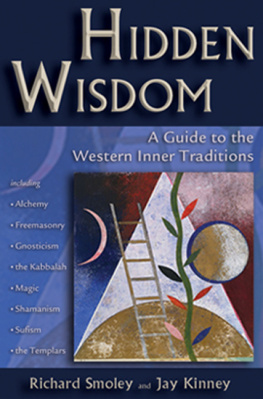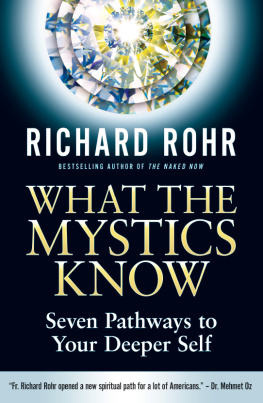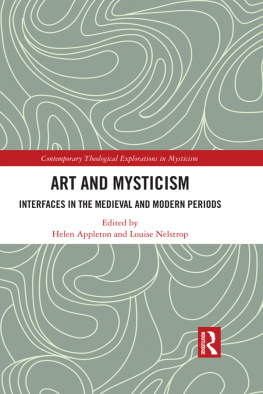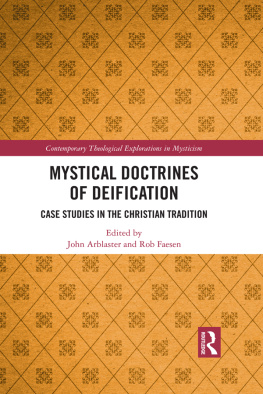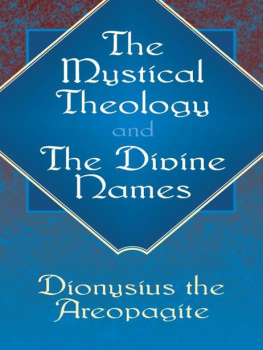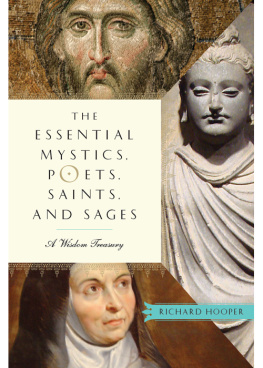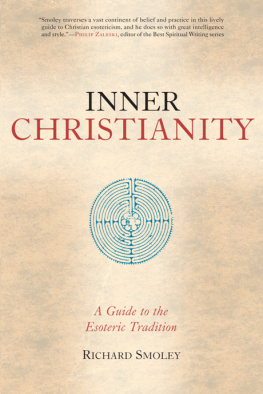This book made available by the Internet Archive.
Author of the Preface
JEAN CHATILLON, who has devoted a Hfetime of study to the Abbey of St. Victor and some of its leading figures, was born in Epinal, in northeastern France, in 1912. Educated in the schools of Metz and Arcachon, he later studied in Toulouse at the Institut Catholique, in Rome at the Angelicum University, and at the Universities of Nancy and Paris. He holds the degrees of Licencie en philosophic, Doc-teur en theologie and Docteur es lettres. He was ordained a priest in 1935 and was later professor in the seminary of Metz. Since 1950 he has been a member of the faculty of the Institut Catholique in Paris, where he is professor of the history of medieval philosophy. In 1961 he was Dean and is now Honorary Dean of the faculty of philosophy. Professor Chatillon began a definitive reassessment of the spirituality of Richard of St. Victor with the publication of studies considering Richard's understanding of the modes of contemplation and the degrees of charity. He has published critical Latin editions of the sermons of Achard and Walter of St. Victor, and also the Liber exceptionum and Uedit cT Alexandre ou les troisprocessions by Richard of St. Victor. In addition to numerous articles in such journals as Revue d'ascetique et de mystique, Revue du moyen age latin, and Archives d'histoire litter aire et doctrinale du moyen age, he has published a major study Theologie, spiritualite et metaphysique dans Voeuvre oratoire d'Achard de Saint-Victor (Etudes de Philosophic Medievale, 58; Paris, 1969). Recently he has been a participant in a number of international conferences, including those on Bonaventure, Peter Abelard and Peter the Venerable, and Thomas Becket, as well as other colloquia and the summer sessions at the C.E.S.C.M. of the University of Poitiers. Chevalier de I'ordre national du Merite and honorary canon of Metz, Professor Chatillon resides in Paris.
Vlll
Editor of this Volume
GROVER A. ZINN was born in 1937 in El Dorado, Arkansas. After taking a B. A. degree in Physics at Rice University, Houston, he studied at Duke University, from which he holds B.D. and Ph.D. degrees. He was a special student in the Faculty of Divinity, University of Glasgow, Scotland, where he served as the Assistant Minister of the Barony Church in Glasgow. Since 1966 he has been on the faculty of Oberlin College, Oberlin, Ohio, where he is presently Associate Professor in the Department of Religion. Professor Zinn is interested in twelfth-century spirituality, especially Vic-torine. His teaching and research activities have extended more broadly to iconography, the liturgy. Christian Utopian communities, particularly nineteenth-century American communities and cross-cultural studies of mysticism and monasticism. At Oberlin he has been involved in organizing and directing several Winter Term workshop projects in meditation (with W. R. Dhiravamsa) and Benedictine Monasticism (with Fr. George Simon and, as visiting lecturer, Br. David Steindl-Rast, O.S.B.). During the years 1972-1973 he pursued research in Oxford, England, as the holder of an NEH Younger Humanists' Fellowship and a Research Status Appointment from Oberlin College. Earlier, in 1968, he was awarded an H. H. Powers Travel Grant by Oberlin and spent two months photographing major medieval sites in England and France. His articles have appeared in such journals as Church History^ History of Religions, Speculum and the University of Toronto Quarterly. He is the author of articles on "Mysticism, Christian" and "Monasticism East and West" (the latter with Donald K. Swearer) in the forthcoming Dictionary of Living Religions (Abingdon Press). At present he is preparing a book on the thought and spirituality of Hugh of St. Victor and is also editing some of his contemplative writings. He resides in Oberlin with his wife Mary and their two children Jennifer and Andrew.
PREFACE
The lengthy introduction which Professor Grover Zinn has given us, at the very outset of this book, makes perfectly clear the reasons why the texts of Richard of St. Victor, that he here presents, merited a choice place in a collection dedicated to the great classics of Western spirituality. The preface that he has asked of me can then only express, for this project carried out so well, the sympathy, esteem and interest that everyone must feel who is familiar with the works of Richard and who has admired their richness and depth.
Richard of St. Victor is, indeed, a great spiritual figure, perhaps one of the greatest, of a Christian medieval time that included so many. He early enjoyed, in this respect, an exceptional authority of which St. Bonaventure and Dante Alighieri, both justly cited by Professor Grover Zinn, are the most prestigious witnesses. He thus exercised, for several centuries, an influence that all the historians of Christian spirituality agree upon, but whose extent they certainly have not completely delineated. It must, however, be recognized that in spite of the favorable judgments continually accorded him, the spiritual teaching of Richard in modern times has been somewhat passed over and neglected. This relative depreciation, whose causes are worth analyzing, is probably due, on the one hand, to the progressive decline of the monastery where Richard, this Scotus come from Scotland or from Ireland, had set his destiny. The Abbey of Canons Regular of St. Victor of Paris doubtless persisted until the French Revolution. But during the two or three last centuries of its exis
PREFACE
tence, it only counted a small number of monks. These did not succeed in sustaining and bringing to fruition the intellectual and spiritual patrimony bequeathed to them by their first fathers. They often left to others, when the time came, the task of printing the works which their glorious ancestors had left, whose manuscripts they kept in their rich library. But these editions, wherever they came from, incomplete and often faulty, seem to have quite early on repelled the readers which they aimed to reach. Everything suggests that from the end of the sixteenth century, or at all events from the seventeenth, only a few theologians or a few scholars continued to familiarize themselves with the writings of the great Victorines, and above all with those of Richard.
Nevertheless, for the last few decades the spiritual works which the latter left us have emerged bit by bit from the shadows to which they had been relegated. All who have reread them, all who have studied them, and who have given them a new scrutiny, have quickly realized that it was necessary to place again before a wide public the rediscovered texts which they had begun to enjoy. Several among them, in various countries, have since undertaken, hesitantly at first, then with increasing assurance, to translate at least some passages which they more particularly appreciated, often adding to their translations, introductions, notes or comments aimed to facilitate reading and to render more easily intelligible a spiritual teaching whose virtues were far from exhausted. To confine ourselves here to the English translations, credit must first be given to the Selected Writings on Contemplation of Richard of St. Victor, published in London in 1957 by Clare Kirchberger. This book offered a translation of long excerpts of two treatises to which were still given the titles Benjamin Minor and Benjamin Major, but which must be identified with the treatises on The Twelve Patriarchs and on The Mystical Ark, which Professor Grover Zinn offers here. To these extracts the book of Clare Kirchberger, however, added some others,

